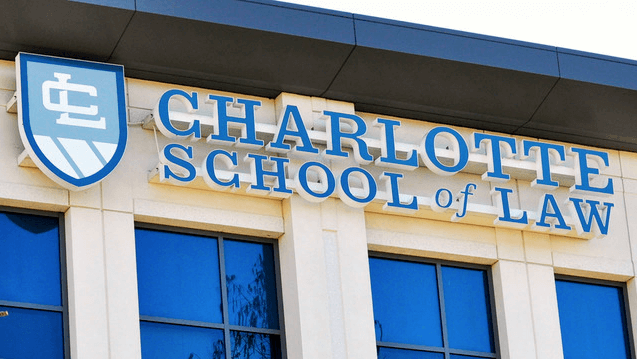
Summary: The Charlotte School of Law is being sued for fraud by two law students.
Two Charlotte School of Law students have filed a class action lawsuit against the troubled institution. They claim that the school knowingly lied to them about academic problems in order to collect tuition. The complaint was filed on Friday by attorneys for Robert Barchiesi and Lejla Hadzic, according to The Charlotte Observer.
In November, the ABA Section of Legal Education and Admissions to the Bar announced that it placed the Charlotte on probation because it was not compliant with ABA accreditation standards. The American Board Association said that Charlotte had low admissions standards and that it failed to prepare its students to pass the bar. The ABA noted that Charlotte’s first-time bar passage rate was a paltry 45%, while the statewide average was 66%. According to WSOC Charlotte, Charlotte School of Law opened in 2006 without accreditation and it was given provisional approval in 2008 before granted accreditation in 2011. Two years ago, it was put under probation.
The plaintiffs said that Charlotte School of Law leaders, including Dean Jay Conison and President Chidi Ogene, were told in July to inform students that the school was in trouble with the ABA; but that they failed to notify students about their maligned admissions practices and ineffectual curriculum. In the lawsuit, plaintiffs said that the reason for this was that the school did not want to lose high-performing students or potential students.
The class action lawsuit said that the school had been told multiple times prior to July to disclose its statistics; and that without this information, numerous students took out thousands of dollars in student loans for a program that they falsely believed was in good standing with the ABA.
Average yearly tuition and fees at Charlotte Law School is $60,000.
This week, the Department of Education said that they would no longer grant financial aid to Charlotte graduates because the school allegedly misrepresented itself to students. Last year, the DOE awarded almost $50 million in loans and grants to Charlotte Law students, who are now scrambling to figure out how to pay for the rest of their education.
“If CSL had complied with its obligations, then it would have resulted in students not paying CSL tuition on or after Aug. 1, and defendants would have incurred substantial financial losses,” the complaint stated.
The lawsuit alleges that Charlotte School of Law is guilty of deceptive and unfair trade practices, unjust enrichment, breach of fiduciary duty and fraud. It stated that its practices were predatory, and it named the school’s owner Infilaw as a defendant.
InfiLaw is a subsidiary of Sterling Partners, a Chicago-based private equity firm. The for-profit consortium consists of three ABA-accredited law schools—Arizona Summit Law School in Phoenix, Charlotte School of Law, and Florida Coastal School of Law in Jacksonville, Florida. It has received poor press because of its low admission standards, its graduates’ poor bar passage rates, and the inability of its students to repay their student loans. The Atlantic documented how InfiLaw slashed its already low admissions standards to the point of being an open enrollment system, and this resulted in catastrophe.
Charlotte School of Law told The Charlotte Observer that they were not aware of the class action lawsuit, but that they were working on the “best possible outcome” for their students.
The plaintiffs have asked for a jury trial and compensatory and punitive damages. Their case is similar to one filed by law school graduate Anna Alaburda against her alumnus Thomas Jefferson School of Law in San Diego. She stated that the law school inflated its employment statistics, including jobs such as retail or part-time work; and she sued for fraud. In March of this year, she lost her case; the jury essentially stating school was not a guarantee means of employment.
Regardless of the Charlotte lawsuit outcome, Charlotte School of Law students may apply to have their federal loans forgiven. After the closing of Corinthian Colleges in 2015, more American students have found that there is a chance they could erase their student loan debt without filing for bankruptcy. Any student or alumni whose school has closed down or was found to be engaging in fraud has a chance to get their federal loans forgiven under a new code referred to as the “borrower defense.” This program was originally designed to help students deceived by for-profit schools, but Department of Education undersecretary Ted Mitchell said, “We will continue to provide forgiveness to every student who has been similarly mistreated.”
For more information, check out the Department of Education’s page.
- Related: ABA Sanctions Two Schools for Low Admissions Standards
- Related: Harvard Law Grad Sues after Failing Bar Exam Twice
- Related: Thomas Jefferson School of Law Alumna Loses Lawsuit
- Related: Law School Blames Students for Its Closing
- Related: Are InfiLaw Law Schools Scamming Students?
- Related: How Can You Get Your Law School Student Loans Forgiven?
Source: The Charlotte Observer
Do you think these students have a chance to winning their lawsuit? Let us know in the comments below.
